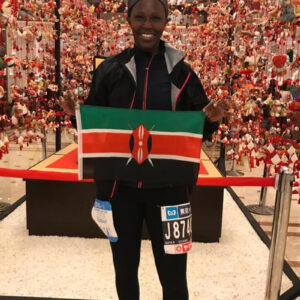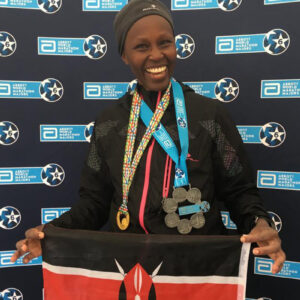How long have you been running and what led you to it?
I have been running since high school, and joined a fun running group called the Hash in my late 20s. I started training and racing in my 30s when I regularly took part in a Corporate Challenge race that raised money for Cleft palate operations. We were a competitive corporate team and got a coach and I remember many evenings running up and down the seating area in Nyayo stadium and pulling tyres as part of the training – something that I had never imagined I would do.
I then met a friend who worked at the same company in 2006, who convinced me that I could run a marathon, and the rest is history …15 marathons later… We recruited another hasher and went from running 10 km as our longest distance to training and running over 30km.
How did your Abbott majors six-star journey begin?
My six-star journey was accidental after running my first marathon in Lewa, I did another marathon which was not as exciting, and was again encouraged by the same friend to run the London marathon.
I got so excited by the crowds and the sheer number of participants that I set off too fast trying to weave around all the people dressed as rhinos, soldiers and in armour( a lot of people wear fancy dress !) and after about 20km my hamstrings were so sore that I had to stop and rest and stretch and really slow down to get to the finish.
From that, I learnt to run at my own pace and not to get too excited by the crowds, especially at the start of the race which is a journey. It’s safer to speed up towards the second half. However, probably the biggest lesson came from running in really cold weather and over hard surfaces over bridges in the New York marathon.
Having arrived straight from Kenya I was not prepared for the cold or for the effect that all the pounding over several bridges would have on my feet several months afterwards … that is when I learnt about massages after races and several years later when I ran the Chicago marathon they had put carpets on their bridges !!!
Another invaluable lesson I learnt was to always carry some money and a phone during a long race as you might need it en route. I was running the Boston Marathon in 2014 when there was a bombing and having run 25.2 miles ( a full marathon is 2. Miles ) I walked around downtown Boston trying to make my way back to the hotel without money, phone food or water and could not contact family or friends to let them know that I was fine.
I was fortunate in that when I started running the majors, I managed to secure places mainly via the public ballot apart from the London marathon when I fundraised for Diabetes and Boston and Tokyo marathons which I attended through a sports tour company.
Boston was by far the hardest marathon to get into and I feel privileged to have run it twice, as after the bombing we were invited to run it the following year.
Planning for a race can be quite intensive for about 4 months, depending on how much running you have been doing beforehand, and securing a slot organizing flights accommodations and visas a well saving for it takes a lot of time. This has meant that I have phased my marathons over several years and made the most of exploring the marathon city.
My training weekly regime was 5 am runs starting from 2 to 4 times during the week. This included a range of paces from slow runs for recovery, to faster runs and when I could fit it in speed work. Over the weekends I usually did one long run from about 7 miles in distance, peaking at 18 miles. As I have grown older, I have stopped fixating on distance and focussed more on the time on my feet and shortened my maximum long run to about 16 miles.
Personally, the hardest race in the majors remains the NYC marathon because of the surface bridges and concrete and the cold start and my favourite marathon has to be Boston for the history, the atmosphere and the crowds.
I am an amateur runner, and not fast at all, and becoming the first amateur Kenyan female to get the 6 stars at the age of 50 has motivated me to keep going despite injuries and the inevitable slowing down as we get older. I also encourage young people to run and be active, as you can take up at any age what is important is that you are physically active throughout your life .
Running a marathon or working towards getting the 6 stars is like working towards work/ life goals. It’s about;
- setting a goal to run/fundraise for a cause – Commitment;
- training for it – building Competence, and;
- waking up every day to train over and over again thereby establishing your Credibility
A little bit of luck also helps along the way, especially financially.
The financial challenge is certainly a reason why we do not have more African 6-star finishers we have people with the commitment competence and credibility they just need the support to secure the six stars.
For Kenya to become a recreational running powerhouse, expanding grassroots running clubs (which started to happen in Kenya) will be key, as clubs create awareness of the benefits of recreational running, and that it is not just an elite sport but something that can be done by everyone for their health and mental wellbeing. Moreover, the recreational running community can be a powerful vehicle to initiate positive change/ development in local Communities in partnership with other community members and government.
In practice, local community clubs could run initiatives such as
- Couch to 5k programmes organised to get more people active in partnership with medical professionals
- Rub regular free/ nominal cost weekly/fortnightly 5 km runs akin to the “Park run” concept as a way to encourage new runners to assess their progress at 5km, build their confidence and meet other runners providing them a route to join running clubs and other more experienced club runners should they wish to
- Recreational running clubs could also consider having a pool of trained coaches to work with them as well as club volunteers
Fundraising at the club level to support runners/community initiatives will be critical if we are to build a running community with purpose!

